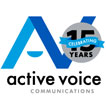
Sometimes when you’re writing, you have all the time in the world. Ha! Just kidding. In marketing, it’s a privilege to have more than a week to complete any one assignment. Add in meetings, email and other everyday activities, and rush writing assignments are often the norm. And that means being able to write quickly — and well — is an important skill for anyone in marketing to develop. Here are eight strategies we use at AVC.
1. Focus.
It sounds simple for sure. But writing well requires concentration, which is difficult to achieve when you’re dealing with constant distractions, whether internal or external. So put your phone in airplane mode, close your social media, quit your web browser and focus on the task at hand. And go ahead and “add to cart” the noise-canceling headphones you’ve been meaning to purchase, because household distractions are some of the hardest to tune out. It also helps to practice some general time-management tips.
2. Have a plan.
A rush job is not the time to “free write.” Start with an outline. If you have stakeholders who tend to make a lot of changes to your copy, have them sign off on your outline now to save yourself from having to go back and make massive edits or, worse, start from scratch later. Get the buy-in you need on the messaging and direction up front.
3. Order transcripts of audio recordings.
Watching a webinar or listening to a recorded interview can take a relatively long time when you’re on deadline. Skimming a transcript is much faster. Plus, it means you can search for keywords and skip right to the source material you need. We like to scan interview transcripts and highlight the best quotes and information so we can easily find it again later. At AVC, we use Rev for transcription, but there are lots of options out there.
4. Organize your source materials.
Once you have an approved outline and you’ve gathered your supporting research, throw everything you need into your working document. Copy and paste from your internal source materials, grab those highlighted interview quotes and pull in necessary statistics, etc. (Hint: We like to highlight or use a different font for information we’ve brought in from third-party sources so we remember to rewrite it and avoid accidental plagiarism.)
This step cuts down on having to interrupt your writing flow to reference supporting materials. That in and of itself is a time-saver, but it also means fewer opportunities for getting sidetracked on the web or sucked into your email.
5. Talk it out.
Really good writing happens at your desk. But brainstorming and thinking can happen anywhere. I personally talk through my ideas on my morning walks and record them in Evernote on my phone. In fact, I sketched out the general framework for this blog post on a walk home from taking my son to school.
When I get back to my desk, I copy and paste my spoken notes into a Google doc. Then, all I have to do is fill in the blanks and clean up the grammar and language. This method also gives me the option of bringing in one of my writers to turn my notes into a final blog post, which is a method that proved perfect for this very post!
6. Just keep typing.
Another way to save time and avoid distractions is by skipping over any speed bumps you encounter along the way. Can’t think of the right word to use or need a stat you didn’t research earlier? Leave a blank and keep writing. Consult Google and your dictionary or thesaurus later. Or, if you’re really crunched for time, ask a team member or freelance editor to help fill in those gaps for you as you’re writing. It helps to be using collaboration software, such as Google Docs or Office 365, in these situations.
7. Avoid editing as you go.
Just as you shouldn’t stop to fill in gaps at this stage, also avoid the urge to edit as you go. Leave refining your copy for a separate step. If you try to do it as you’re writing, the actual writing will take longer. Save your critical brain for later and let your creativity flow. This is also a great task for a co-worker or freelance editor.
8. Practice timed writing.
Becoming a better, faster writer takes practice. Don’t wait for rush work projects to grow your skills. Give yourself regular writing prompts and set a timer. We bet you’ll see more and more words on the page the more often you sit down to write.
As marketers, we don’t often have the luxury of time when it comes to writing. We have to write quickly when there’s breaking company news or an executive who needs something from us. Being ready for those moments helps make them feel less stressful.
